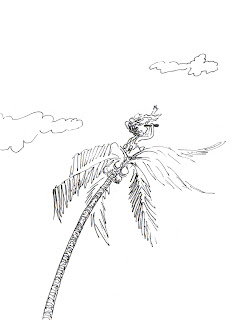 |
| Illustration by Kerry Millard, from Nim's Island |
 |
| Illustration by Kerry Millard, from Nim's Island |
 I gobbled Naming Maya when I first read it, swept up by its story, its characters and its sense of place. I’ve reread it several times since that first rapid perusal, and with each new reading I find another facet of the story.
I gobbled Naming Maya when I first read it, swept up by its story, its characters and its sense of place. I’ve reread it several times since that first rapid perusal, and with each new reading I find another facet of the story.
There are so many things about this book that I long to discuss with other people who have read it too. It makes me wish I had a daughter so I could talk it over with her – and that leads me to believe that it’s a perfect selection for a mother-daughter book group. What do people who have daughters think? Is this a book that you would choose to read with girls in your family?
“Language can make you a stranger in many places, but only if you let it,” Maya observes in a place where Hindi, English, and Tamil all compete for her attention. How does Kamala Mami bring Maya’s family together in spite of their differing languages and customs?
Shared history and memory both are unifying and divisive in this novel. How does Kamala Mami’s chaotic flood of memories help Maya to live with her own?
In an earlier PaperTigers post, Filipino author Lara Saguisag discusses how different values and different dreams lead to varying forms of childhood. How do cultural values and the protection that they can offer contribute to the differences between Maya and her cousin?
And perhaps most of all – did other readers immediately go out in search of Indian food when they finished reading this book? I certainly did!

By Kirsty OUP-UK
With Oscar season in full swing it seems fitting that this month’s Very Short Introduction column comes from Patricia Aufderheide, author of Documentary Film: A Very Short Introduction. Patricia is a professor in the School of Communication at American University, Washington DC, and in the past has served as a Sundance Film Festival juror and as a board member of the Independent Television Service. Regular OUPblog readers will also have read Patricia’s previous posts for OUPblog here, here and here.
Yesterday was Peace Day – thousands of people around the world stopped to stand together for a world without conflict, for a world united:
PEACE is more than the absence of war.
It is about transforming our societies and
uniting our global community
to work together for a more peaceful, just
and sustainable world for ALL. (Peace Day)
There is an ever-increasing number of children’s books being written by people who have experienced conflict first hand and whose stories give rise to discussion that may not be able to answer the question, “Why?” but at least allows history to become known and hopefully learnt from.
For younger children, such books as A Place Where Sunflowers Grow by Amy Lee-Tai and illustrated by Felicia Hoshino; Peacebound Trains by Haemi Balgassi; and The Orphans of Normandy by Nancy Amis all  focus on children who are the innocent victims of conflict. We came across The Orphans of Normandy last summer. I was looking for something to read with my boys on holiday, when we were visiting some of the Normandy World War II sites. It is an extraordinary book: a diary written by the head of an orphanage in Caen and illustrated by the girls themselves as they made a journey of 150 miles to flee the coast. Some of the images are very sobering, being an accurate depiction of war by such young witnesses. It worked well as an introduction to the effects of conflict, without being unnecessarily traumatic.
focus on children who are the innocent victims of conflict. We came across The Orphans of Normandy last summer. I was looking for something to read with my boys on holiday, when we were visiting some of the Normandy World War II sites. It is an extraordinary book: a diary written by the head of an orphanage in Caen and illustrated by the girls themselves as they made a journey of 150 miles to flee the coast. Some of the images are very sobering, being an accurate depiction of war by such young witnesses. It worked well as an introduction to the effects of conflict, without being unnecessarily traumatic.
The story of Sadako Sasaki, (more…)
What a great funny post. I loved the Jungian insights and your honesty re your subconscious processing. My duaghter has decided she will be Nim for Book Week next year. I hope she doesn't try to kill me off to make it more authentic!
Just be very suspicious if she asks you to go whale watching...